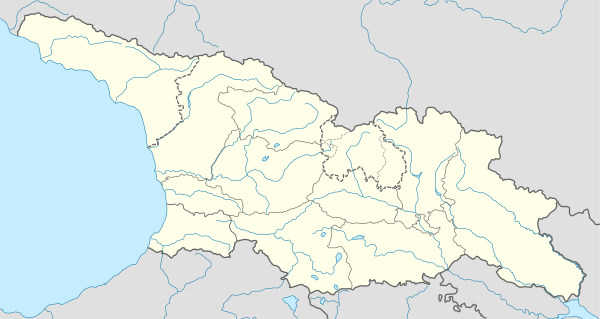Bedia Cathedral
| Bedia Cathedral ბედიის მონასტერი | |
|---|---|
|
Bedia Cathedral and the Caucasus Mountains in the background. | |
 Shown within Georgia (country) | |
| Basic information | |
| Location |
Bedia, Tkvarcheli District, Agubedia, Ochamchire Municipality, |
| Geographic coordinates | 42°46′02″N 41°40′08″E / 42.7672°N 41.6689°ECoordinates: 42°46′02″N 41°40′08″E / 42.7672°N 41.6689°E |
| Affiliation | Georgian Orthodox Church |
| Region | Caucasus |
| District | Tkvarcheli District |
| Architectural description | |
| Architect(s) | Avtandil Shulavreli |
| Architectural type | Domed cruciform plan |
| Architectural style | Georgian; Cathedral |
| Groundbreaking | Late 10th century |
| Completed | 999, during the reign of King Bagrat II of Abkhazia |
| Specifications | |
| Dome(s) | 1; the dome and drum are collapsed |
Bedia Cathedral (Georgian: ბედიის მონასტერი) is a medieval Georgian Orthodox cathedral located in Bedia, in the Tkvarcheli district of Abkhazia (or Ochamchire Municipality according to the Georgia's subdivision), a disputed region on the Black Sea coast.
Bedia Cathedral was originally built at the close of the 10th century and consecrated in 999 on the behest of King Bagrat II of Abkhazians, who would go on to become King of the Georgians as Bagrat III and who was interred at the church after his death. The extant edifices, however, date back to the 13th-14th centuries and include a domed cruciform church, a belltower resting upon the northern narthex and the ruins of an old palace. The southern wall of the main church contains fragments of contemporary murals, including the portraits of Bagrat II and the representatives of the Dadiani noble family of Georgia.
In the Catholicate of Abkhazia, Bedia was the centre of a diocese and the seat of a Bishop. In the 17th century, services were ceased, but resumed from the second half of the 19th century onwards.
Gallery
External links
- Photographs and background information (Russian)
References
| Wikimedia Commons has media related to Bedia Cathedral. |
- ↑ Abkhazia's status is disputed. It considers itself to be an independent state, but this is recognised by only a few other countries. The Georgian government and most of the world's other states consider Abkhazia de jure a part of Georgia's territory. In Georgia's official subdivision it is an autonomous republic, whose government sits in exile in Tbilisi.
| ||||||||||||||||||||||||||||||||||||||



